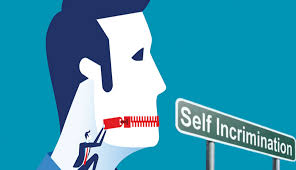
Right against self- incrimination
Right against self- Incrimination
The definition of self-incrimination involves willingly subjecting oneself to prosecution or incrimination, usually by providing testimony or evidence.
In India, the constitution protects accused individuals from self-incrimination, stating that "no person accused of an offence shall be compelled to be a witness against himself." The legal principle "nemo teneteur prodre accussare seipsum" forms the basis of this protection, asserting that "No man is obliged to be a witness against himself."
Article 20(3) outlines specific criteria for the protection of individuals accused of a crime, providing safeguards for those who have faced a formal accusation and charge.
The requirement to act as a witness is prohibited due to the fact that making statements under compulsion, which is considered as duress, is not admissible in court. Duress refers to a physical action and cannot be related to a person's mental state. Physical action includes acts such as beating, threatening, or imprisoning close ones. Article 20(3) prohibits the use of such compulsion.
It also prohibits compulsion that leads to giving evidence against oneself. An accused person can be forced to participate in an investigation by providing thumb impressions or writing samples, or by exposing their body for identification purposes. However, if a person makes a confession without any inducement, threat, or promise, Article 20(3) does not apply. The accused can choose to waive their right against self-incrimination by voluntarily making an oral statement or producing incriminatory documentary evidence.
Right to Silence: This common law principle is known as the "Right to Silence." It implies that a court of law should not be inclined to determine that an accused person or suspect is guilty of a crime only because he or she has chosen not to answer inquiries from the police or the court.
The Indian Constitution includes the Right to Silence as a fundamental right that is accessible to anybody who is accused of a crime, as stated in Article 20(3).
Giving up the right to be self-incriminated
As a general legal concept, it is recognized that no one may surrender their fundamental rights, including the right to self-incrimination, which is protected by Article 20(3). The specific facts and circumstances of each case determine whether the rule is applicable. The prerequisites for claiming this protection include "external force" or "compulsion," but if the accused knowingly declines to use the right at hand and makes a statement that contradicts himself out of his own free will, it can be argued that the right under Article 20(3) is forfeited.
It has been disputed whether scientific methods like brain mapping tests and narco-analysis tests breach Article 20(3)'s prohibition against self-incrimination or are admissible for use in enhancing investigations. The court concluded in Gobind Singh v. status of Madhya Pradesh that a person's mental status falls under the purview of their "Right to Privacy." Article 20(3) violated Article 21 of the Indian Constitution by invading someone's privacy and liberty.
The Karnataka High Court determined that forcing the accused to reveal the password or biometrics would not violate the prohibition against self-incrimination in the first case, Virendra Khanna v. State of Karnataka, 2021 SCC OnLine Kar 5032. This is because the mere disclosure of a password, passcode, or biometric is not incriminating and is relevant to searches as allowed by Section 93 of the Criminal Procedure Code (CrPC)3, which permits the ordering of a search of a "place" or a specified area.
Conclusion:
The accused has the right to silence on any matter that could be used against them as evidence, and Article 20(3) guarantees that the Constitutional prohibition against self-incrimination is upheld. It also applies to those who are forced to testify, in which case all evidence gathered is rendered inadmissible in a court of law. Additionally, the law states that an accused person cannot be subjected to torture or coerced into making confessions. Techniques that breach the right to privacy and infringe article 20(30) include narco-analysis and polygraph testing. These techniques are only appropriate in extreme situations.












comments